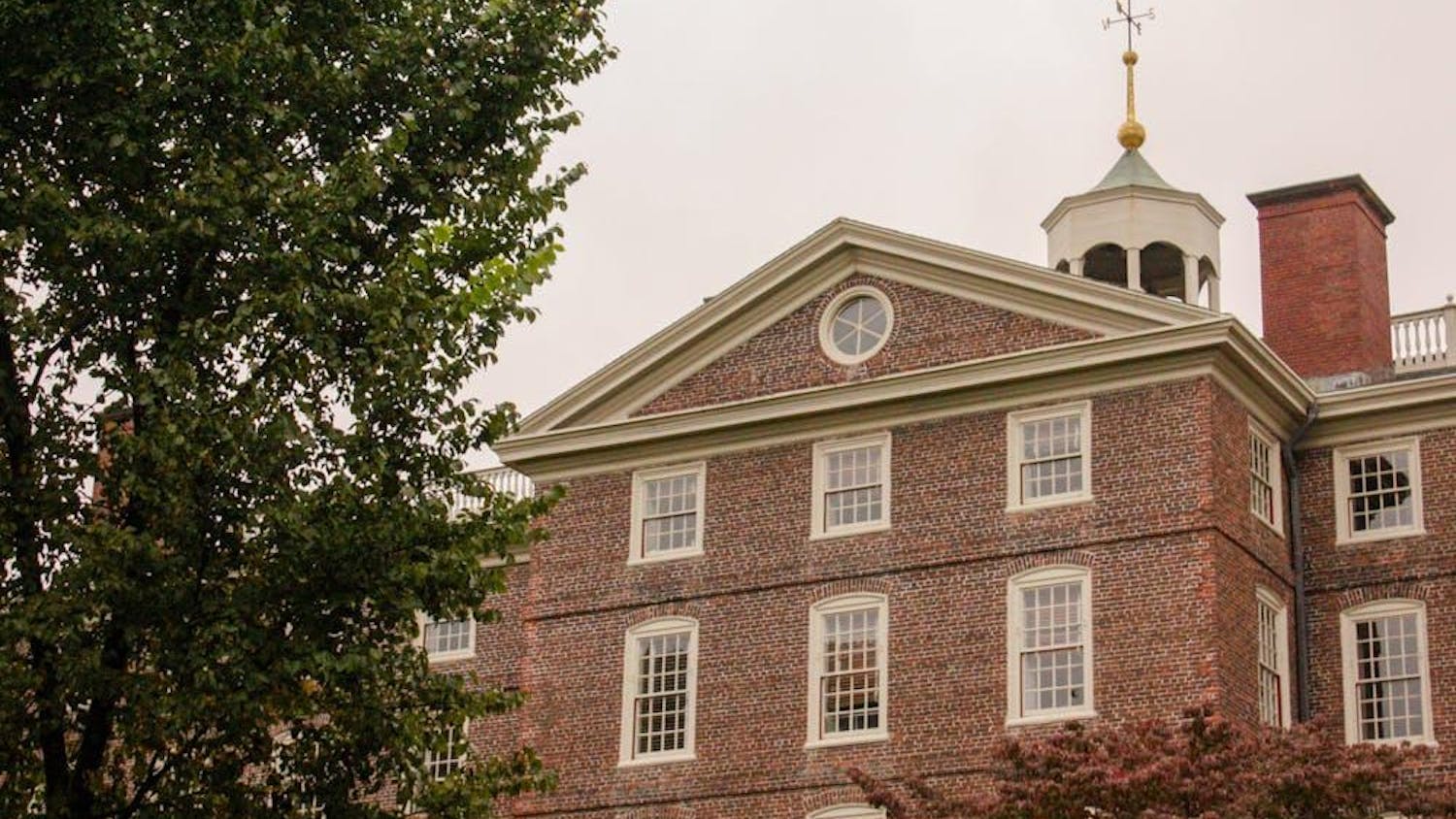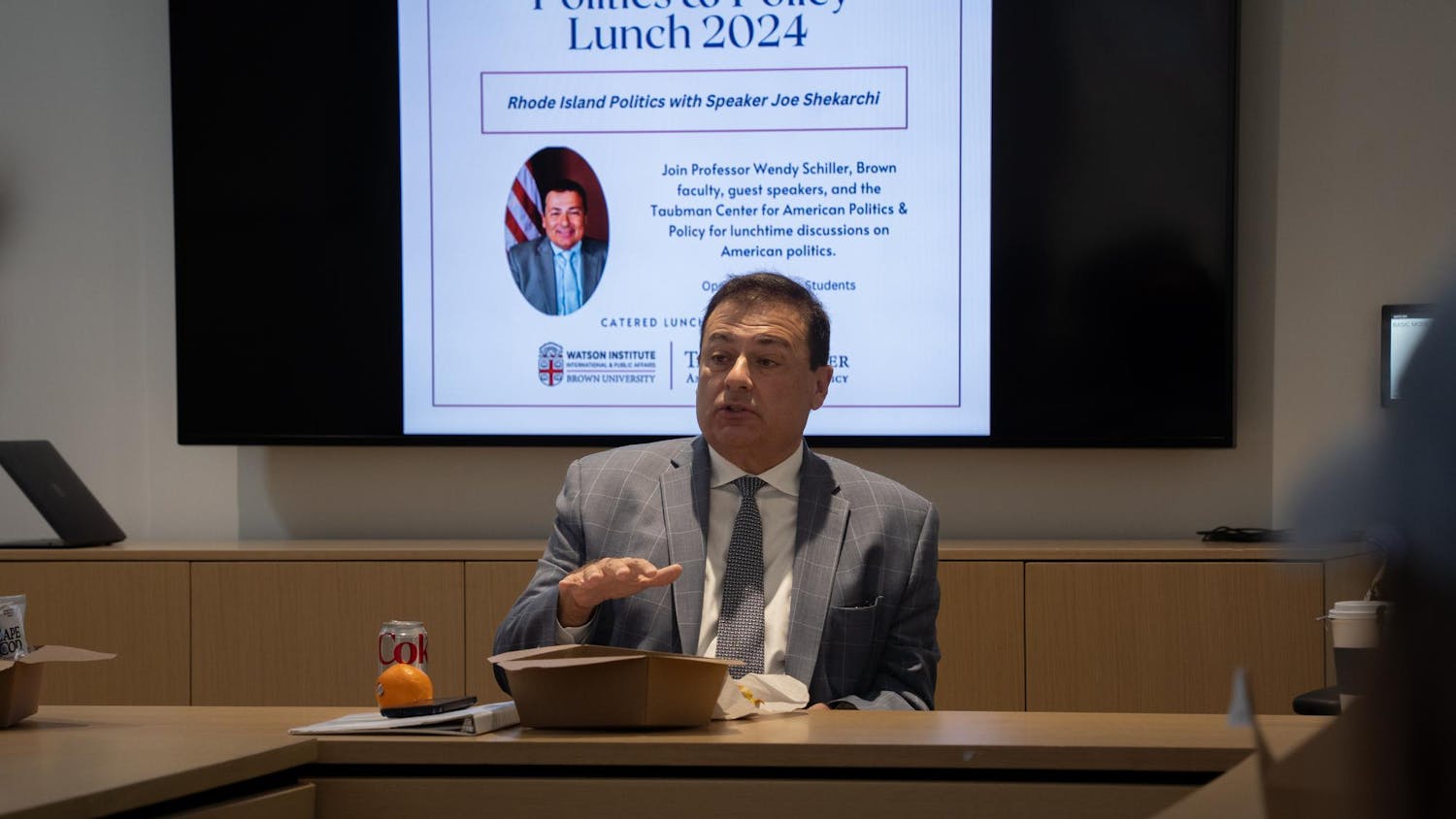Faculty members and administrators debated the University’s response to the Reports on the Events of October 29 at Tuesday’s faculty meeting. Attendees also discussed the University’s fiscal performance, the renaming of the Watson Institute for International Studies and a possible new classification for distinguished lecturers.
After citing her response to the Reports on the Events of October 29, which was released on Sept. 24, President Christina Paxson said faculty members have frequently asked what disciplinary action was taken against student leaders of the protest that shut down a lecture last October by former New York City Police Commissioner Ray Kelly and whether or not they were “punished.”
Both University rules and federal law stipulate that the process is “confidential” and will be “handled like the hundreds of incidents” that go through the disciplinary process every year, Paxson said.
Faculty members expressed widely varying reactions to the University’s process of dealing with the fallout from the protest — while some commended Paxson for her response to the aftermath and events of October 29, others voiced concerns.
Professor of Biology Kenneth Miller ’70 P’02 objected to the Brown community being “left in the dark” over what was transpiring between the University and students. The fact that a disciplinary process is happening is not confidential, Miller said, adding that the community was inexcusably uninformed after a senior administrator told to The Herald that there would be no disciplinary actions taken.
Other faculty members said they were disappointed in the lack of information on possible consequences, saying they wanted to see efforts to educate the community about collboratively dealing with controversial events as opposed to punitive results. Paxson responded that the Student Code of Conduct will undergo its review this spring — a process that happens every five years — with the exception of sexual assault policies, which are currently under review.
Paxson said she worries about “chilling the campus” in considering how to respond to the Kelly controversy, as she does not want community members to stop inviting controversial speakers or invited speakers to decline invitations.
The meeting also addressed faculty disagreements over the reports submitted by the Committee on the Events of October 29. The reports categorize the events that transpired as “protests,” though some faculty members questioned the events’ disruptive nature, suggesting that shutting down an event should not be labeled as a protest.
“The Student Code of Conduct supports protests as long as they don’t censor speech,” Paxson said. The protests to Kelly’s lecture escalated and led to censorship on campus, she said, and that is “something we don’t do.”
John Tomasi, professor of political science and director of the Political Theory Project, questioned the extent of inclusivity of viewpoints at Brown.
A member of the Brown Republicans came to Tomasi after class recently to tell him that after attracting about 25 interested students, the student and a few of his peers decided to set up a table on the Main Green, Tomasi said. Shortly after group members set up their table, another student approached them and called them “racist,” he added. The remark disrupted the students’ work, and they disbanded soon after.
“What do we mean by ‘inclusive’?” Tomasi said. “We should aspire for, at minimum, the confidence that students may sit on the Main Green without being called racists.”
Richard Locke, director of the Watson Institute, said he thought Paxson’s response to the Kelly controversy was “terrific.”
“The proof is in the pudding,” he said, adding that controversial speakers have come to campus since last October and provoked protests and backlash without students’ breaking of the Code of Conduct.
The capital campaign for Paxson’s strategic plan, “Building on Distinction,” and the University’s endowment were other prominent issues raised at the meeting.
With $600 million raised so far, the University is now in the “nucleus phase,” or “silent phase,” of the campaign, Paxson said. The University will continue in this early phase until next fall, she added.
Addressing the endowment’s growth, Paxson said the University’s 16.1 percent return on its investments in fiscal year 2014 was a “good” performance.
Chief Investment Officer Joseph Dowling said the University normally targets a 8.5 percent return on the endowment’s investments, so compared to this benchmark, “the last two years have been good to Brown.”
Though two peer institutions have yet to publish their investment records for the previous fiscal year, Brown’s endowment fared better than Harvard’s 15.4 percent return but worse than Yale’s approximately 20 percent return, Dowling said. Last year, Brown had the second-highest return in the Ivy League, he added.
When faculty members inquired what tactics the Investment Office used that were similar to or different from peer institutions, Dowling said his office is mimicking no one. “We are not following anyone. We are leaders forging our own path.”
The endowment currently stands at $3.2 billion, with $185 million in operating funds, Dowling said. The endowment supports 16 percent of the operating budget, he added. In fiscal year 2014, the Investment Office made $455 million and distributed $146 million to the University, he said.
In the last two years, investment profits totalled $780 million, Dowling said, a figure larger than the entire endowment in 1996.
In the last five years, the endowment has increased by $1.1 billion, and $675 million of this growth has gone to the University’s budget, Dowling said. “That comes out to about $17,000 per student, including graduate students,” he said.
But the fiscal situation is a “mixed message,” Paxson said. Though the endowment is doing well, the University is working with an $8.7 million budget deficit, which was larger than the expected a $4.4 million budget deficit for fiscal year 2014, she said. “This is due to an unexpected increase in financial aid and a decrease in federal funding.”
If University spending stays at this pace, the deficit could be $13.8 million, and the unrestricted reserves could decrease to zero in three years, Paxson said. “We have three years to get this under control.”
The deficit is structural, Provost Vicki Colvin said, meaning that “it won’t go away on its own.” Following Yale’s example by mandating departmental and organizational 1.5 percent budget reductions is “not the Brown way of doing things,” she said.
Calling the deficit a “shared responsibility,” Colvin said faculty members need to “examine assumptions on how (they) work.”
Twelve faculty members, one graduate student and two undergraduates will form the upcoming Deficit Reduction Committee, whose membership is currently undecided, Colvin said. She asked the faculty to contact her for interest in becoming members or for input on the committee’s focus.
Colvin said she wants to work to increase middle-class financial aid, increase socioeconomic diversity among students and boost “underfunded” graduate education.
James Morone, director of the Taubman Center for Public Policy and American Institutions and chair of the Faculty Executive Committee, said the complete report on the merging of the Taubman Center under the Watson Institute’s “umbrella” will come next month, adding that one of the notable parts of the merger will be the name change of the Watson Institute. It will be called the “Center for International and Public Affairs,” he said.
The University is also considering creating a third tier of lecturers — currently there are only lecturers and senior lectures, though tenure-track professors have three tiers, Morone said.
The qualifications, name and possible pay increase for this third tier are still under deliberation, said John Stein, senior lecturer in neuroscience and FEC member.
Faculty members also read two memorial minutes for George Borts, professor emeritus of economics, and Gerald Guralnik, professor of physics, both of whom died this year.
ADVERTISEMENT




